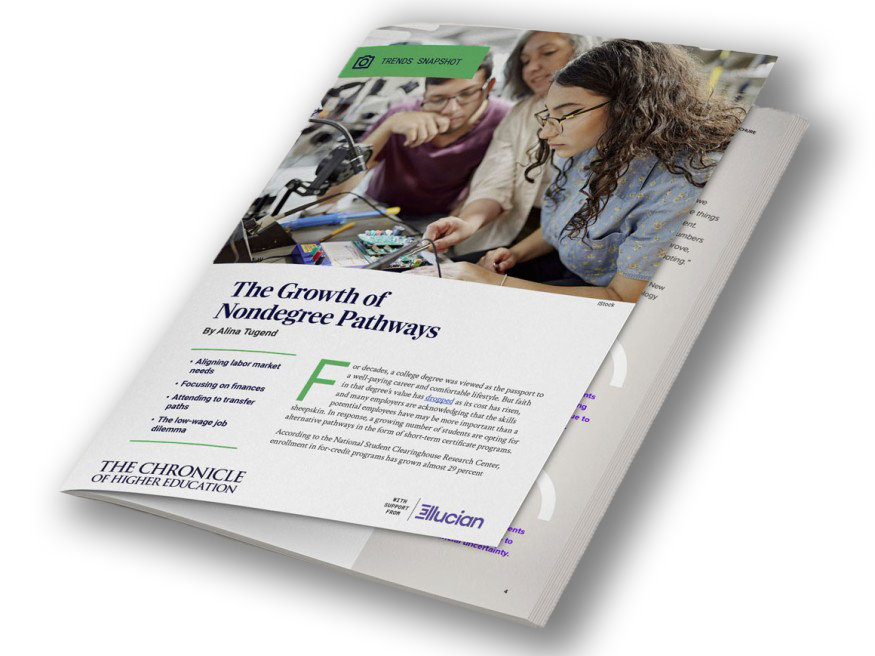Why is workforce alignment critical to the success of continuing education?
Economies across the world are witnessing rapidly evolving job markets, and as a result the concept of lifelong learning has taken on a new urgency. Lifelong learning refers to the ongoing pursuit of knowledge and skills throughout an individual's career and life — not limited to a traditional degree path. As industries adapt to advancements in technology and shifting economic priorities, the demand for continuous skill development has intensified. CE/WFD programs, including certificate courses, micro-credentials, and professional development offerings, are now essential tools for lifelong learning. These programs enable institutions to provide flexible, accessible, and targeted education that enables learners to upskill or reskill throughout the entirety of their careers. For higher education institutions, this presents a dual opportunity: addressing workforce needs while securing a sustainable financial future through diversified program offerings.
The Shifting Landscape for Continuing Education
Recent data underscores a significant trend: while full degree enrollments face challenges, non-degree programs are experiencing growth. According to enrollment data collected by the National Student Clearinghouse Research Center, undergraduate certificate program enrollment grew for the fourth consecutive year, up 9.9% during Fall 2024, highlighting a growing appeal for non-degree educational attainment alongside traditional programs.
We know this growth in credentials outside of 2- and 4-year programs is driven by various learner personas including:
- Career Advancers: Professionals seeking to upskill and reskill to gain promotions.
- Career Explorers: Individuals seeking educational opportunities that will aid in a pivot to a new career field.
- Guidance Seekers: Learners who are uncertain about their career path and are seeking skills advancement that will also help guide career placement.
- Knowledge Lovers: Individuals driven by curiosity or personal enrichment who value continuous learning, even when it's not tied directly to a job or career move.
As the labor market shifts, higher education must shift to meet these types of learners and job seekers where they are. This means offers platforms that monitor necessary competencies, offering guidance that aligns existing skills with emerging opportunities, and creating personalized pathways to support learners navigating their educational journey.
Aligning Education Opportunities with Market Demands
The alignment between educational offerings and labor market requirements is critical to the success of not only learners and the industries they support, but also the success of colleges and universities. The Bureau of Labor Statistics research highlights the correlation between higher educational attainment and increased earnings and lower unemployment rates. However, the full degree pathway isn't the sole route to success. CE/WFD programs, certificates, and micro-credentials offer targeted skill development, enabling learners to adapt swiftly to market needs.
To maintain a competitive edge in the skills economy, institutions need tools that support a diverse range of learners and data to make more informed resourcing decisions — such as revamping curriculum to teach more in-demand or applicable skills or cutting programs.
Enabling Lifelong Learning with Ellucian Journey
To support institutions in this evolving landscape, Ellucian introduced lifelong learning with Journey — a powerful, cutting-edge solution designed to bridge the gap between continuing educating offerings and workforce demands. Journey leverages AI-driven skills mapping to align institutional curricula with real-time labor market data, ensuring that institutions are well prepared to meet job market demand and learners acquire competencies that employers actively seek.
Key features of Journey include:
- Personalized Learning Pathways: Leverage AI to generate skills from course catalogs and LMS data, allowing you to tailor CE/WFD experiences to individual learner's goals and existing skill sets.
- Dynamic Skills Mapping: Create an engagement funnel for lifelong learning by continuously updating skills maps based on the latest industry trends and job market changes.
- Enhanced Learner Engagement: Motivate, engage, and retain learners with gamified elements that create an interactive, goal-oriented learning environment.
With Journey, institutions are well-equipped to attract and support learners with an appetite to grow their skillsets in this skills-first economy.
Seizing the Opportunity
For institutions aiming to boost enrollment and revenue, expanding CE/WFD programs is a strategic imperative. By embracing solutions like Ellucian Journey, institutions can better market relevant, flexible learning opportunities that meet the needs of today's diverse learners and the ever-evolving workforce landscape.
To explore how Ellucian Journey can transform your institution's approach to lifelong learning, download our eBook.


